by Anuradha Srinivasan, Sri Lalitam Trust, Pondicherry, December 6, 2021
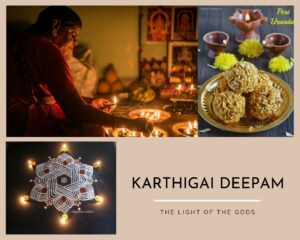
Rows of unlit lamps dot both sides of the street, all the way to the village temple tank. Women dressed in colourful silk saris, draw intricate geometric patterns, or kolams, at the entrance to their house. In the centre of each kolam stands a kuthu vilakku or ornamental brass lamp, with smaller clay lamps, agal vilakkus, placed in a circle around it.
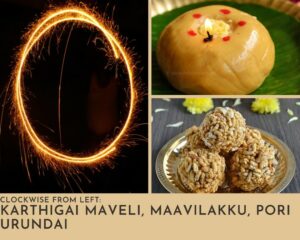
Figure 1: Karthigai Maveli, Maavilakku, Pori Urundai
The scents of camphor, jaggery, and jasmine flowers mingle in a unique way that proclaims festivities. It is all hustle and bustle in the kitchen. Amma rushes to give final touches to the neivedyam or offering of pori urundai (puffed rice and jaggery balls), sweets, and fruits. Paati keeps a watchful eye on the wonderful sweet dishes, and warns children not to touch them before the pooja. A young girl and boy finish their maavilakus, lamps made of rice flour and jaggery, and place them with the neivedyam. Appa and thatha move around importantly, hanging up thoranams or festoons, drinking cups of hot coffee, and impatiently calling for the women to finish the kitchen work soon. Akka and anna are at the temple, setting up the Sokka Panai, and putting wicks in the temple lamps. The Sokka Panai, a tall rocket-like structure made of dried palm leaves and filled with crackers, is set up just outside the village temple.
Outside the house, the neighbourhood children twirl homemade fireworks around their heads and all about them, like a burning hula hoop. These crackers, called Karthigai Sutru or maveli, are made of charcoal. Elders warn excited children to be careful with the maveli and not to go too close to the Sokka Panai, and continue chattering as they wait.
The air is tinged with anticipation and excitement as everyone prepares for the most important event of the evening. Soon, a fire is seen on the top of the Thiruvannamalai hill, and a cry goes up! The Karthigai Mahadeepam has been lit. People bustle about lighting the lamps at home and all along the street.
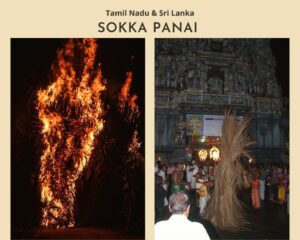
Figure 2 : Sokka Panai
At the temple, the Sokka Panai is set on fire. As the heat lights up the crackers and devours the tinder-ready palm leaves, adults and children alike experience the divine Jyothi of Lord Shiva in the burning fire.
The sky is lit with the golden glow of thousands of earthen lamps, jostling with the cool light of the full moon on Karthigai Pournami.
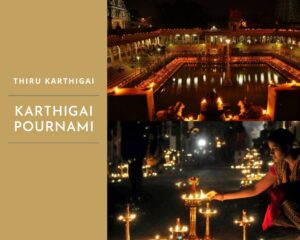
Figure 3: Agal Vilakku & Kuthu Vilakku being lit in temples and on streets
Karthikai Vilakkeedu, Dev Deepavali , Lakshabba , Thrikarthika, or Karthigai Deepam – they are all names for an ancient and beautiful festival celebrated in many parts of India. Karthigai Deepam is also an important festival for Tamil communities across the world – in Sri Lanka, Malaysia, the United Kingdom, the United States of America, and more.
Karthigai Deepam is one of the oldest festivals or peruvizha, celebrated by the Tamil people. There are references to the festival of Karthigai Deepam and the lighting of lamps by the famous Tamil poetess Avvaiyaar, as well as in Sangam literature from 2nd to 5 century CE, such as the Akananuru, Natrinai.
The name Karthigai is an allusion to Karthikeya or Lord Murugan, and the Karthigai Penn, or the six Krittika apsaras who took care of Lord Murugan in his childhood. It is believed that the Karthigai Penn, Śiva, Sambhūti, Prīti, Sannati, Anasūya, and Kṣamā, were blessed by the Goddess Parvati for their devotion and care to Lord Murugan.
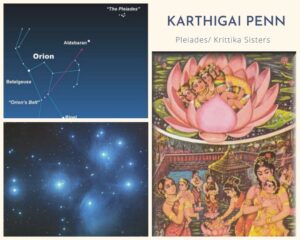
Figure 4: Karthigai Penn with Lord Murugan as a baby, represented by the constellation Pleiades or Karthika
They became the star cluster known as Krittika or Karthika, and are represented by the constellation of Pleiades.
The month following Deepavali is also known as Karthigai Maasam. In southern India, Karthigai begins on the day of Deepavali. Throughout this month, people pray and fast, and light earthen lamps or agal vilakkus every evening. In the olden days, people used to make homemade firecrackers called mavalis or mavelis, and burn them in the evening. However, this is a fast-disappearing tradition and today, mavelis are seen only in a few rural pockets of Tamil Nadu.
The festival ends with Karthigai Deepam, also known as Mahadeepam, on Karthigai Pournami. On the final day of Karthigai Deepam, people celebrate by lighting lamps, burning firecrackers, and visiting temples.
A holy fire, called the Karthigai Mahadeepam is lit on the hills of Thiruvannamalai in Tamil Nadu and Koneshwaram in Sri Lanka. The Karthigai Jyothi or Mahadeepam is the culmination of a nine-day festival in Thiruvannamalai. This event is watched by millions of devotees in India and abroad. Karthigai Deepam signals the end of the Hindu festival season and also marks the transition from the festive month of Karthigai to the cold, austere days of Margazhi.
Origins of the Karthigai Deepam festival
Southern India
There are various stories about the origins of the Karthigai Deepam festival.
In Tamil Nadu, Karthigai Deepam is marked as the birthday of Lord Murugan. It is also celebrated in honour of Lord Shiva. It is believed that Lord Vishnu and Lord Brahma once argued about who was more powerful. To settle the argument, Lord Shiva appeared as the Jyothiswarupam, or the Divine Fire, and asked both the Gods to find the beginning and the end of the fire.
Brahma transformed into a swan, or annam, and tried to find the beginning while Vishnu became Varaha, or a boar, and dove down to find the end. After several centuries had passed, neither of them was able to find the beginning or the end of the fire, and had to return defeated. Their ego suitably quashed, Lord Vishnu and Lord Brahma accepted that Lord Shiva was the greatest of them all, and prayed to Him for forgiveness.
The Mahadeepam lit on the Thiruvannamalai and Koneshwaram hill (Sri Lanka), alludes to the Jyothiswarupam, the limitless radiance of God. It is a reminder of man’s eternal quest for more, that feeds his ego, and how surrender to the divine can defeat his ego.
Significantly, the name of the presiding deity at the Thiruvannamalai temple, Lord Arunachaleshwara, and the traditions of Karthigai such as the lighting of the lamps or vilakkus, crackers, and the Sokka Panai are all connected with fire. Indeed, the Thiruvannamalai hill itself where the Mahadeepam is lit is an extinct volcano. Aeons ago, perhaps even at the very site where the Mahadeepam is lit today, rivers of molten lava and fire would have poured out of the mountain and down the countryside.
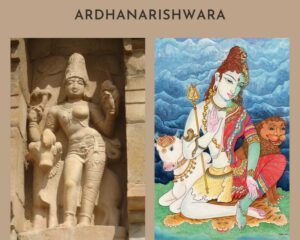
Figure 5 : Ardhanarishwara in Gangaikonda Cholapuram; Painting
Yet another story revolves around Goddess Parvati & Lord Shiva in their combined form as Ardhanarishwara. One day Goddess Parvati playfully closed the eyes of Lord Shiva. The entire universe was plunged into darkness and there was immense suffering across the world. Many living beings died without the light of the sun. To atone for this act, Goddess Parvati did penance atop Thiruvannamalai hill. Pleased with Her penance, in due course of time, Lord Shiva appeared before Her in the form if a fire and merged with Her, thus creating the half-male, half-female avatar known as Ardhanarishwara.
In India, Karthigai Deepam is primarily celebrated in Tamil Nadu, Karnataka, Andhra Pradesh, Telangana. The first day is called Appa Karthigai, the second day Vadai Karthigai and the last day, Thiru Karthigai. The Vaishnava community including Tamil Vaishnavas, celebrate the day as Vishnu Karthigai or Vishnu Deepam to mark the awakening of Lord Vishnu. Vaishnavas also believe that this is the day Lord Vishnu appeared in the Matsya avatara, to save the world from deluge.
In the Nilgiri hills of Tamil Nadu, Karthigai is celebrated as Lakshabba. In Kerala, Thrikarthika commemorates the Goddess Kathyayani or Bhagawathi Amma.
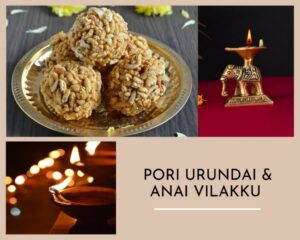
Figure 6 : Elephant Lamp & Pori Urundai
There is an interesting story about the significance of the Gaja Vilakku or Anai Vilakku (Elephant Lamp) and the pori urundai offered as neivedyam. Long ago, a princess in southern India grew up with an elephant and grew to love him like a brother. When she married and left her kingdom, she missed the elephant very much. In memory of her elephant brother, on Karthigai Deepam day, the princess prayed for his good health. Then she lit an elephant lamp and offered pori urundai which resembled the rice balls that elephants ate. In southern Tamil Nadu and some parts of Kerala, on Karthigai Deepam, an anai vilakku is lit and women pray for the good health and prosperity of their brothers with the following chant –
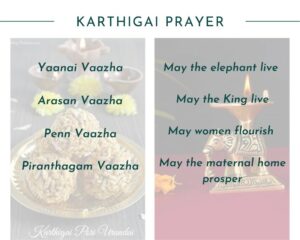
Figure 7: Karthigai Prayer
Northern India
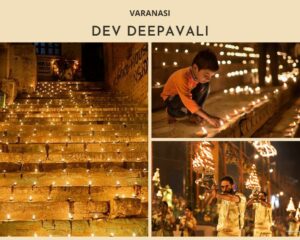
Figure 8 : Dev Deepavali in Varanasi
Northern Indian towns such as Varanasi or Kasi mark the day as Dev Deepavali. People take a dip in the holy river Ganga, known as Kartik Snan. In the evening, millions of lamps light up the steps of the ghats, on the banks of the river, and float down the Ganga.
It is believed that on Kartik Poornima or Karthigai Pournami day, Lord Shiva killed Tripurasura, a trio of demon brothers named Tarakaksha, Vidyunmali, and Kamalaksha. The asuras had created flourishing cities in Tripura, a group of three moving forts, which ali
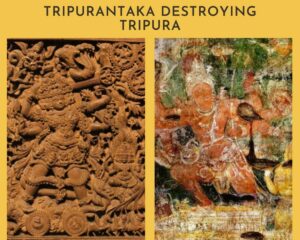
Figure 9: Lord Shiva as the five-headed Tripurantaka destroying Tripura, with Mount Meru as the bow, strung with Vasuki the Snake, standing on a chariot with Surya and Chandra as wheels
gned for a split second, once every thousand years. Tripurasura had a boon that they could be killed only if all of Tripura, or all the three forts, could be destroyed at the same time.
With a single arrow, the Pashupatastra, Lord Shiva destroyed Tripura, and was honoured as Tripurantaka.
In the Thiruppugazh, a slight variant of the same story is recorded. The Devas exulted in the belief that thanks to their help, Lord Shiva would finally destroy Tripura. Aware of these thoughts and wanting to teach the Devas a lesson, when the time came to destroy the three forts, Lord Shiva burned down Tripura with a mere smile. He is thus honoured as Sirithu Purameritha Peruman, ‘The Lord Who Burned Cities with A Smile’.
With lighted lamps and colourful rangolis, people welcome the devas, or the gods, who descend to the earth to celebrate Lord Shiva’s victory over the asura.
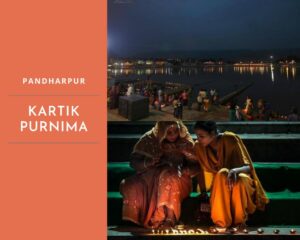
Figure 10: Kartik Purnima in Pushkar
In Pushkar, in the desert state of Rajasthan, Karthigai Pournami is the last day of Prabodhini Ekadashi, or a period of fasting. Prabodhini Ekadashi marks the end of Chaturmas, the four months when Lord Vishnu is believed to be asleep. On Karthigai Pournami, Lord Vishnu finally awakens and Vishnu devotees celebrate the day with prayers, a ceremonial bath, and lighting of lamps. The annual Pushkar Mela held on this occasion is very famous and attracts thousands of tourists and visitors.
Western India
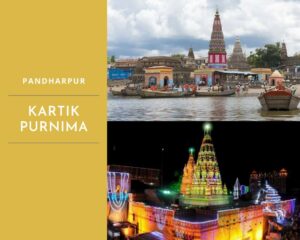
Figure 11 : Kartik Purnima in Pandharpur
The state of Maharashtra hosts an annual yatra or pilgrimage in Pandharpur. The Pandharpur Karthik Yatra or fair is very famous and wari, or pilgrimage to the Rukmini Vitthala temple, is undertaken by millions of devotees. Karthigai Pournami is celebrated as the day that Lord Vithoba or Vitthala, an avatar of Lord Vishnu, wakes up after his cosmic slumber.
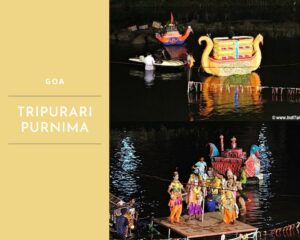
Figure 12 : Tripurari Purnima in Goa
In the seaside state of Goa, Karthigai Pournami is known as Tripurari Poornima and celebrated in the village of Sankhelim near the river Valavanti. Thousands of lamps are lit and set afloat the river, and people celebrate the victory of Lord Krishna (not Lord Shiva!) over Tripurasura with fireworks and boat competitions.
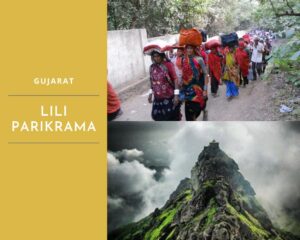
Figure 13 : Girnar or Lili Parikrama in Gujarat
Gujarat celebrates a five-day festival ending on Karthigai Pournami. Devotees of all castes and communities walk together from the Dudheshwar temple, Junagadh to Mount Girnar. The walk ends with Girnar Parikrama , or Lili Parikrama. Devotees circle Mount Girnar, in a ritual resembling the Girivalam of Thiruvannamalai (where devotees circle the hill on Karthigai Pournami).
It is significant that Gujarat is home to three important archaeological sites, Lothal, Dholavira, and Surkotada, that showed the spread of the Indus Valley or Harappan civilisation. Various experts have opined that the Harappans were the ancestors of the Dravidians. Perhaps the Girnar Parikrama harks back to a time when ancient Dravidians, (some would say ancient Tamils!), inhabited not just southern India but also a large part of northern and western India.
Eastern India
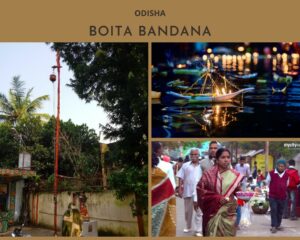
Figure 14 : Boita Bandana in Odisha
In Odisha in eastern India, thousands of boat-shaped lamps made of banana stem and coconut sticks are floated on the Mahanadi, The Great River, to mark the festival of Boita Bandana on the same day as Karthigai Deepam. Akasa Dipa, or sky lamps, are lit inside earthen pots that are then hoisted high up on ceremonial bamboo poles, after prayers.
Another festival celebrated in parts of Odisha is Kartikeshwar Pooja, beginning on Karthigai Pournami day. This five-day festival commemorates the victory of Lord Karthikeshwar also known as Karthikeya or Skanda, the son of Lord Shiva, over the asura Surapadman. On the fifth day, the idols of Lord Kartikeshwar are immersed in the river. Interestingly, the Soorasamharam festival at Tiruchendur temple celebrates the same event, but earlier in the month, before Karthigai.
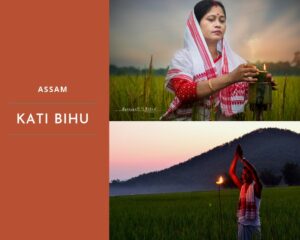
Figure 15 : Kati Bihu – Lamps in Paddy fields & Akash Banti in Assam
Assam in eastern India celebrates the day as Kati Bihu or Kongali Bihu. Not to be confused with Bohag Bihu, the more popular spring festival, Kati Bihu symbolises a time of reflection and prayer, with the cold winter setting in, and nearly empty granaries and. In villages, Kati Bihu is celebrated by lighting earthen lamps called saki near the tulasi plant at home, in the garden, granaries, and paddy fields. Farmers place lighted lamps called Akash Banti or Sky Lamp, on top of bamboo poles around the fields. These lamps are believed to guide the visiting spirits of ancestors back to heaven.
Around the World
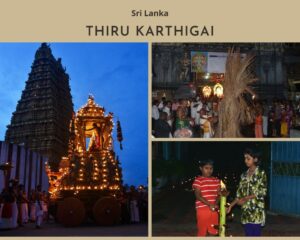
Figure 16 : Karthigai Deepam in Sri Lanka
The Tamil community of Sri Lanka celebrates Karthigai Deepam with the same fervour as in India. The Konesar hill is famous for not just the ancient Koneshwaram temple but also the Mahadeepam lit on Thiru Karthigai.
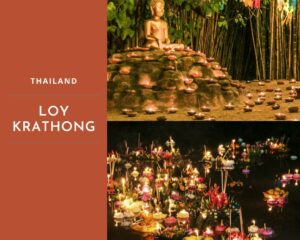
Figure 17 : Loy Krathong – Festival of Lights in Thailand
Loy Krathong in Thailand is celebrated on or around Karthigai Pournami with floating lamps made of banana stem, oil lamps placed around the Buddha, and sky lanterns released in the memory of ancestors. Tazaungdaing in Myanmar, when people light earthen lamps and sky lanterns, is known as the Festival of Lights. It is celebrated to mark the end of the month of Kathina and to pray to ancestors.
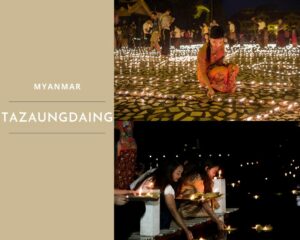
Figure 18 : Tazaungdaing – Festival of Lights in Myanmar
Loy Krathong & Tazaungdaing are believed to be Buddhist adaptations of an ancient Hindu festival celebrated in earlier times, very likely Karthigai Deepam.
Isn’t it remarkable that so many cultures, thousands of kilometres apart, with different languages, cuisines and customs, are still connected by an ancient festival from a shared past?
Karthigai Deepam, Dev Deepavali, or Loy Krathong, the names may differ, but they all hail the victory of good over evil, humility over ego, and light over darkness.
—–x——x——x—–x—–
- Lexicon of Tamil Words
Amma – Mother
Appa – Father
Paati – Grandmother
Thatha – Grandfather
Akka – Elder Sister
Anna – Elder Brother
- Listen to some popular songs on Lord Muruga
- Pazham Nee Appa, sung by Faridha https://vimeo.com/547289311
- Muthai Tharu, sung by Madhu Iyer https://vimeo.com/510225354
- Nee Allal Deivam Illai, sung by Sirkazhi Govindarajan https://www.youtube.com/watch?v=TfswXJ-COmw
- Asaindhadum Mayil, sung by Sudha Raghunathan https://www.youtube.com/watch?v=bq_8f3Yxv0w
- Find out how to make mavelis here
- https://www.youtube.com/watch?v=BoTE3TJis2U
- https://www.youtube.com/watch?v=zfPrBD2_xYU
- https://www.youtube.com/watch?v=OOT_K7P1i-0
- How to make https://www.youtube.com/watch?v=OOT_K7P1i-0
- Make maavilakku or Edible lamps with these tutorials
- https://www.youtube.com/watch?v=cJrPvxQ8uGk
- https://traditionallymodernfood.com/maa-vilakku-maavilakku-recipe/
- Some Karthigai recipes
- https://www.youtube.com/watch?v=6hlMRaD2pX0
- https://www.jeyashriskitchen.com/pori-urundai-recipe-karthigai-pori-urundai/
References & Images – Bibliography
| Sno | Reference | URL |
| 1 | Karthigai Sokka Panai | https://www.vikatan.com/spiritual/temples/109531-why-are-they-burning-chokkapanai-on-karthigai-deepam-day |
| 1a | Karthigai Sokka Panai | https://www.youtube.com/watch?v=SJ_bORILVbY |
| 1b | Karthigai Sokka Panai | https://www.seithipunal.com/spiritual/chokkapanai-on-karthigai-deepam |
| 1c | Karthigai Sokka Panai | https://www.youtube.com/watch?v=lfKmYD8wfVM |
| 1d | Karthigai Sokka Panai | https://www.vikatan.com/spiritual/functions/142982-this-article-is-about-the-golden-memories-of-karthikai-deepam-festival |
| 2 | Karthigai Sutru or Maveli | https://www.youtube.com/watch?v=BoTE3TJis2U |
| 2a | Karthigai Sutru or Maveli | https://www.youtube.com/watch?v=zfPrBD2_xYU |
| 2b | Karthigai Sutru or Maveli | https://www.youtube.com/watch?v=OOT_K7P1i-0 |
| 2c | Karthigai Sutru or Maveli | How to make https://www.youtube.com/watch?v=OOT_K7P1i-0 |
| 3 | Karthigai Vilakkeedu | https://en.wikipedia.org/wiki/Karthika_Deepam |
| 4 | Dev Deepavali in Varanasi | https://www.dnaindia.com/lifestyle/report-kartik-purnima-2021-date-timings-significance-and-quotes-on-dev-diwali-2920245 |
| 4a | Dev Deepavali in Varanasi | https://youtu.be/NT_n5zDFBsI |
| 5 | Thrikarthika | https://www.hindu-blog.com/2008/12/thrikarthika-kartika-vilaku-festival-of.html |
| 6 | Reference to Karthigai in Akananooru | http://ponniyinselvan.in/forum/discussion/43755/karthigai-deepam-in-tamilnadu-one-of-the-oldest-celebrations/p1 |
| 6a | Reference to Karthigai in Akananooru | https://en.wikipedia.org/wiki/Karthika_Deepam |
| 7 | Karthigai Penn | https://en.wikipedia.org/wiki/K%E1%B9%9Bttik%C4%81 |
| 7a | Krittika Nakshatra | https://popularvedicscience.com/krittika-nakshatra/ |
| 7b | Pleiades | http://bharatkalyan97.blogspot.com/2017/04/krittika-pleiades-in-taurus.html |
| 8 | Karthigai Festival | http://bharatmoms.com/blog/thiruvannamalai-karthigai-maha-deepam-the-festival-of-lights/ |
| 8a | Karthigai festival explanation in Tamil | https://www.youtube.com/watch?v=ZEzC1VXFqn0 |
| 9 | Story of Karthigai | https://www.subbuskitchen.com/thirukarthigai-recipes-karthigai-deepam/ |
| 9a | Story of Karthigai | http://bharatkalyan97.blogspot.com/2017/04/krittika-pleiades-in-taurus.html |
| 10 | Thiruvannamalai Extinct Volcano | https://www.lonelyplanet.com/india/tamil-nadu/tiruvannamalai/attractions/mt-arunachala/a/poi-sig/1287096/356494 |
| 11 | Ardhanarishwara | http://www.arunachalasamudra.org/ardhanarishvara.html |
| 11a | Ardhanarishwara | https://divinediyaas.blogspot.com/2017/11/karthigai-deepam-part-1.html |
| 12 | Vishnu Karthigai | https://www.hindu-blog.com/2008/12/vishnu-deepam.html |
| 13 | Gaja Vilakku | https://www.subbuskitchen.com/thirukarthigai-recipes-karthigai-deepam/ |
| 13a | Yaanai Vaazhga poem | https://www.subbuskitchen.com/thirukarthigai-recipes-karthigai-deepam/ |
| 14 | Dev Deepavali | https://en.wikipedia.org/wiki/Dev_Deepawali_(Varanasi) |
| 14a | Kartik Purnima & Tripurantaka | https://en.wikipedia.org/wiki/Kartik_Purnima |
| 14b | Tripurantaka & Tripura | https://en.wikipedia.org/wiki/Tripurantaka |
| 15 | Sirithu Puram Eritha Peruman | https://en.wikipedia.org/wiki/Tripura_(mythology) |
| 15a | Sirithu Puram Eritha Peruman | https://youtu.be/NT_n5zDFBsI |
| 16 | Prabodhini Ekadashi & Chaturmas | https://en.wikipedia.org/wiki/Prabodhini_Ekadashi |
| 17 | Pushkar Mela | https://en.wikipedia.org/wiki/Pushkar_Fair |
| 18 | Pandharpur, Kartik Purnima | https://www.hindu-blog.com/2009/10/pandarpur-kartik-ekadasi-yatra-in.html |
| 18a
|
Pandharpur, Kartik Purnima | https://bha1blog.wordpress.com/2015/11/23/22nd-nov-2015-kartik-ekadashi-pandharpur/ |
| 18b | Wari | http://www.vitthalrukminimandir.org/english/vari.html |
| 19 | Goa Kartik Purnima | https://www.heraldgoa.in/Cafe/When-Tripurasur-will-be-killed-yet-again%E2%80%A6in-Sankhali/80445 |
| 19a | Goa Tripurari Poornima | https://www.financialexpress.com/lifestyle/travel-tourism/goa-to-welcome-tripurari-poornima-festival-in-november/428420/ |
| 20 | Girnar Parikrama Dravidian | https://pravase.co.in/thingstododetail/302/india/gujarat/junagadh/lili-parikrama-junagadh |
| 21 | Indus Valley or Harappan Civilisation sites | https://www.gujarattourism.com/kutch-zone/kutch/surkotada-indus-valley-civilization.html |
| 22 | Dravidian Link to West & North India | https://indianexpress.com/article/explained/indus-valley-civilisation-script-ancient-dravidian-language-link-7461402/ |
| 23 | Boita Bandana | https://theitinerantblog.wordpress.com/ |
| 24 | Kartikeshwar Puja ,Odisha | https://www.hindu-blog.com/2014/10/kartikeswar-puja-in-orissa-kartikeswar.html |
| 25 | Soorasamharam, Tiruchendur | https://en.wikipedia.org/wiki/Soorasamharam |
| 26 | Kati Bihu in Assam | https://assam.gov.in/about-us/399 |
| 26a | Kati Bihu in Assam | https://dglifepace.blogspot.com/2013/10/kartik-purnima-kati-bihu-of-assam.html |
| 26b | Kati Bihu in Assam | https://en.wikipedia.org/wiki/Bihu |
| 27 | Akash Banti | https://www.sentinelassam.com/guwahati-today/akakh-bonti-flickering/ |
| 28 | Karthigai in Sri Lanka | https://culturama.in/2019/12/03/giving-form-to-the-infinite/ |
| 28a | Karthigai in Sri Lanka | https://www.tamilguardian.com/content/karthikai-deepam-ancient-tamil-festival-lights?EC0124C4-506B-E744-9C48-8E3134CE0975_safekids_cup_B2E7DBCB_5BD4_4A23_86A9_329C9410AC8F_Wz0wFzxdWk8aCA9hSSQoMgkiHRr2EuYfAkUzPwJI-wMI5xb6AKHn9fD1EfcGPMpZHfH77QfNoM8fztvsEfBc8-PI5Mme-M7OwuQN4u-0z-rB0bbH_Q== |
| 28b | Karthigai in Sri Lanka | http://passionparade.blogspot.com/2010/11/kaarthigai-theepam-triumph-of-light.html |
| 28c | Karthigai in Sri Lanka | https://en.wikipedia.org/wiki/Karthika_Deepam |
| 29 | Loy Krathong, Thailand | https://en.wikipedia.org/wiki/Loy_Krathong |
| 30 | Tazaungdaing, Myanmar | https://en.wikipedia.org/wiki/Tazaungdaing_festival#cite_note-4 |
| 31 | Tazaungdaing,Myanmar | https://web.archive.org/web/20111202124817/http://www.mmtimes.com/2011/timeout/603/timeout3160305.html |
| Figure no | Image | URL /Attribution |
| Title Image | Title Image : Lady lighting lamp | https://rove.me/to/india/karthigai-deepam |
| Pori Urundai | https://www.ticklingpalates.com/pori-urundai-recipe-nel-pori-urundai-recipe-karthigai-deepam-recipes/ | |
| Kolam | https://twitter.com/beingpavithraS/status/1332968647808061442/photo/1 | |
| Figure 1 | Maveli | https://jeevansworld.blogspot.com/2016/ |
| Maavilakku | https://rakskitchen.net/maavilakku-recipe-how-to-make-maavilakku-mavu/ | |
| Pori Urundai | https://www.ticklingpalates.com/pori-urundai-recipe-nel-pori-urundai-recipe-karthigai-deepam-recipes/ | |
| Figure 2 | Sokka Panai | https://www.vikatan.com/spiritual/temples/109531-why-are-they-burning-chokkapanai-on-karthigai-deepam-day |
| Figure 3 | Woman Lighting Kuthu Vilakku on Street | https://www.pinterest.fr/pin/313000242826827061/ |
| Lamps in Madurai Temple | https://www.pinterest.com/pin/229542912233661051/ | |
| Figure 4 | Pleiades | https://discover.hubpages.com/religion-philosophy/Orion-and-The-Pleiades-in-history-and-the-Bible |
| Karthigai Nakshatram | https://barbarapijan.com/bpa/Nakshatra_radical/03krittika.htm | |
| Painting of Karthigai Penn with Lord Murugan | http://murugan.org/gallery/kanda_puranam/html/kp_04.htm | |
| Figure 5 | Ardhanarishwara sculpture in Gangaikonda Cholapuram | Vickyavw, CC BY-SA 3.0 <https://creativecommons.org/licenses/by-sa/3.0>, via Wikimedia Commons; https://commons.wikimedia.org/wiki/File:Arthanatheswarar.JPG |
| Mural of Ardhanarishwara | By Copyrighted to Himalayan Academy Publications, Kapaa, Kauai, Hawaii. Licensed for Wikipedia under Creative Commons and requires attribution when reproduced., CC BY-SA 2.5, https://commons.wikimedia.org/w/index.php?curid=2354602 | |
| Figure 6 | Pori Urundai | https://www.ticklingpalates.com/pori-urundai-recipe-nel-pori-urundai-recipe-karthigai-deepam-recipes/ |
| Anai Vilakku | https://www.pinterest.com/pin/681028774910555411/ | |
| Agal Vilakku | https://vocal.media/futurism/karthigai-deepam-at-tiruvannamalai-the-ten-days-of-celebration | |
| Figure 7 | Karthigai Prayer | https://www.subbuskitchen.com/thirukarthigai-recipes-karthigai-deepam/ |
| Figure 8 | Dev Deepavali in Varanasi | https://www.thequint.com/lifestyle/dev-deepawali-2021-date-when-is-dev-diwali-and-why-it-is-celebrated |
| Lamps on the Ghats of Varanasi | https://www.pinterest.es/pin/399413060704106792/ | |
| Girl lighting lamps | https://www.pinterest.es/pin/98375573090594019/ | |
| Figure 9 | Tirpurantaka destroying Tripura | By Clinton Steeds – originally posted to Flickr as "Album Cover with Shiva as the Destroyer of the Tree Cities of the Demons (Tripurantaka)", CC BY 2.0, https://commons.wikimedia.org/w/index.php?curid=5681347 |
| Tirpurantaka destroying Tripura | https://www.thehindu.com/society/history-and-culture/one-shot-that-felled-three-forts/article17844844.ece | |
| Figure 10 | Karthik Poornima in Pushkar | https://rajasthantourismbuzz.files.wordpress.com/2014/11/ghat-night.jpg |
| Women lighting lamps | https://dailynews360.patrika.com/dharam-karam/today-the-last-great-bath-of-kartik-purnima-pushkar-is-taking-a-bath-trembling-in-the-cold-93195.html | |
| Figure 11 | Karthigai Pournami in Pandharpur | https://indianexpress.com/article/cities/mumbai/warkaris-urge-govt-to-allow-winter-pilgrimage-to-pandharpur-with-new-covid-regulations-7057841/ |
| Rukmini Vitthala Temple | https://www.pandharpurlive.com/2017/06/photo.html | |
| Figure 12 | Tripurari Purnima in Goa | https://www.inditales.com/dev-deepawali-tripurari-purnima-goa/ |
| Figure 13 | Girnar or Lili Parikrama in Gujarat | https://yatradham.org/blog/girnar-parikrama-route-map-girnar-parvat-yatra-girnar-mountain-dattatreya/ |
| Girnar Mountain Dattatreya Temple | Nileshbandhiya, CC BY-SA 3.0 <https://creativecommons.org/licenses/by-sa/3.0>, via Wikimedia Commons | |
| Figure 14 | Boita Bandana in Odisha | By Amshpatten – Own work, CC BY-SA 4.0, https://commons.wikimedia.org/w/index.php?curid=101226131 |
| Woman carrying lamp & festive offerings | https://mycitylinks.in/all-about-kartika-purnima-and-its-traditional-observance/ | |
| Akasa Deepa | http://mrutyunjayparija.blogspot.com/2014/10/aakash-deepa-akash-dipa-kartika-masa-ra.html | |
| Figure 15 | Kati Bihu in Assam | By Gjbhd – Own work, CC BY-SA 4.0, https://commons.wikimedia.org/w/index.php?curid=73710024 |
| Woman praying in paddy field | https://twitter.com/thekhatiaxomiya/status/806158326841147393 | |
| Figure 16 | Thiru Karthigai in Sri Lanka | https://www.tamilguardian.com/content/karthikai-deepam-ancient-tamil-festival-lights?EC0124C4-506B-E744-9C48-8E3134CE0975_safekids_cup_B2E7DBCB_5BD4_4A23_86A9_329C9410AC8F_Wz0wFzxdWk8aCA9hSSQoMgkiHRr2EuYfAkUzPwJI-wMI5xb6AKHn9fD1EfcGPMpZHfH77QfNoM8fztvsEfBc8-PI5Mme-M7OwuQN4u-0z-rB0bbH_Q== |
| Figure 17 | Loy Krathong in Thailand | https://sambadenglish.com/loy-krathong-the-boita-bandana-equivalent-in-bangkok/ |
| Earthen lamps around the Buddha | https://www.lonelyplanet.com/articles/celebrate-loi-krathong-chiang-mai | |
| Figure 18 | Tazaungdaing in Myanmar | https://www.myanmore.com/2020/11/festivals-in-november-2020/ |
| Lady lighting lamps on ground | http://www.jackkurtzphotography.net/2015/11/myanmars-festival-of-lights.html |